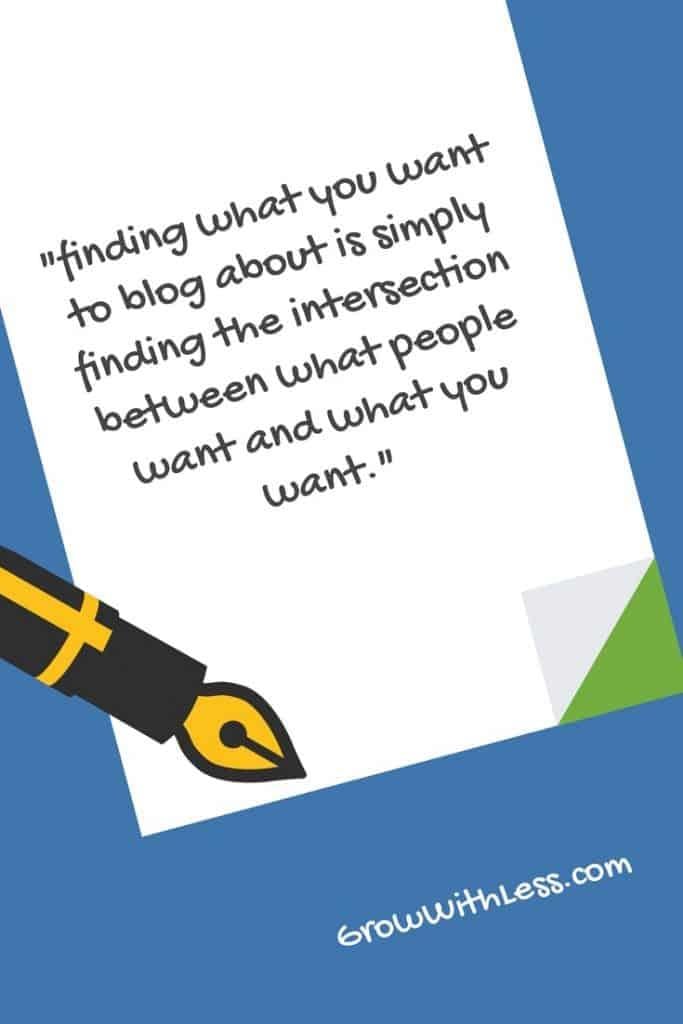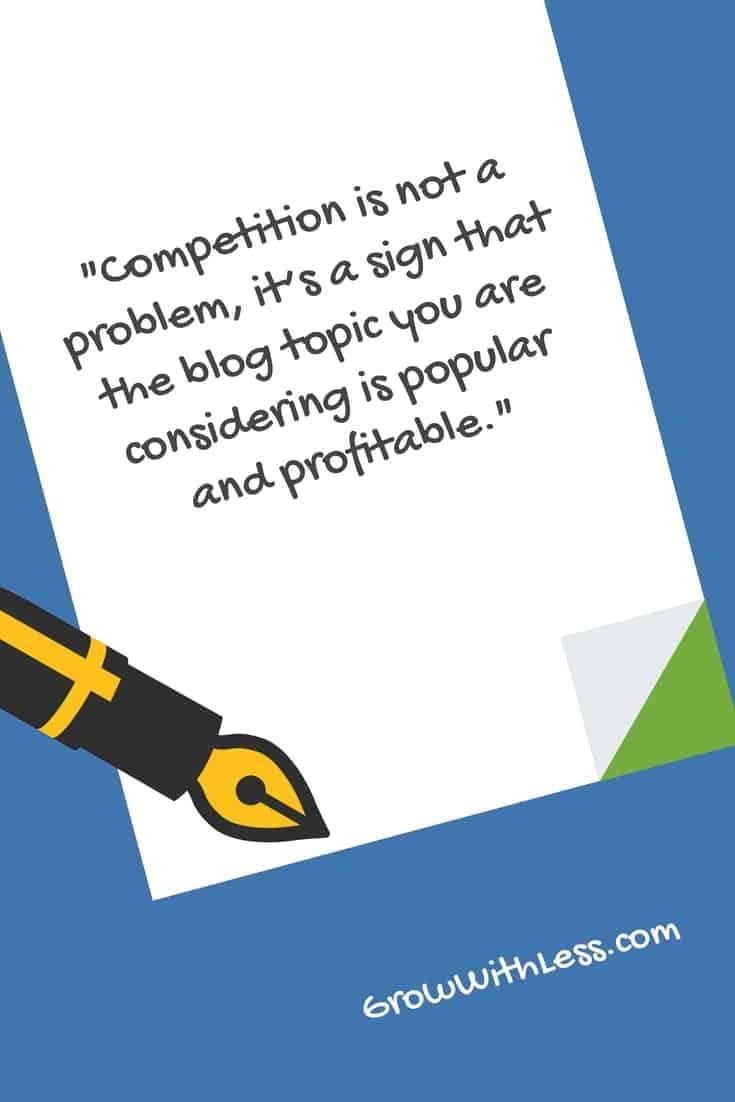There is a lot of bad advice when it comes to finding a blog niche.
“Write about your passion.”
“Choose the most profitable niche.”
“Don’t choose a crowded niche.”
This advice is well-intentioned but ignores key psychological principles and causes many bloggers to give up blogging after a few months.
That’s a shame because finding what you want to blog about is simply finding the intersection between what people want and what you want.
This article will help you do that with the help of a few (sometimes counter-intuitive) questions.
Looking for examples of successful blogs to inspire you? Here is a list of 8 popular blogs in various niches.
Use the Reverse Passion Method to find what to blog about
Most blogs tell you to find a blog topic you are passionate about. The idea is that with passion as your weapon, you will never run out of article ideas.
The problem is that it**’s often easier to know what you hate and what frustrates you than what you are passionate about**.
If finding one’s passion was that easy, there wouldn’t be 17,000 people Googling “how to find your passion” every month.
Which is why I recommend following what I call the Reverse Passion Method.
Instead of asking yourself: what am I passionate about?
Ask yourself:
- What makes you angry?
- What frustrates you?
- What keeps you up at night?
I started French Together because I was frustrated by all the language courses and blogs teaching useless vocabulary like “peony” to beginners.
I started Grow With Less because I could no longer stand to see bloggers recommending terrible hosting providers like Bluehost and giving advice that was better for their wallet than for their readers.
Using the Reverse Passion Method helped me get started because it gave me a lot to write about. I knew what annoyed me and what I wanted to change so finding article ideas was easy. All I had to do was write about the things that frustrated me. And the more I wrote, the more article ideas I had.
It also helped me keep going when things got tough because I had a real desire to make a difference.
Think about the people, businesses, and blogs you admire
When you imagine having a successful blog, who do you have in mind? Do you picture an existing blog? Is there a blog you wish were your blog? A business you admire?
Write down all the names that come to mind, no matter how relevant you think they are.
You may be tempted not to write some names because you’re ashamed or are afraid people may judge you. Don’t do it, write down everything that comes to mind no matter how crazy or ridiculous. You can always delete them from the list later. And remember, this is your list, you don’t have to show it to anyone.
What you will find is that some of these names may surprise you. What you may also find is that many of the people and businesses you wrote down have something in common.
For me these were people like Paul Jarvis, Mark Manson, James Clear, Ramit Sethi or Glen Allsopp.
These are all bloggers in the behavior change/self-help or marketing/SEO/blogging niche. A sign that these could be good blog topics for me.
Think about the things people ask you for help with?

Is there something your friend regularly ask you to help with?
Recipe ideas? DIY advice? Fashion advice? Computer help? Relationship help?
Whatever it is, write it down. At first, nothing may come to mind. You may feel that there is nothing your friends ask you to help with. But if you take a few minutes to think, you should come up with at least a few topics.
If nothing comes to mind, read the messages you send to your friends and you will start to see a pattern emerge.
These could be things as random as dating or parenting advice or more concrete skills such as investing advice.
Again, do not censor yourself. Write down everything you notice, no matter how useless or unprofitable you think it may be as a blog niche.
Make a list of what your friends say you are good at
You’re likely good at things you don’t realize you are good at.
My friends generally say I’m a great listener and I’m good at giving helpful relationship advice.
Your friend may think you are great at organizing parties. They may think you are great at coming up with great outfits.
And you may never realize it unless you ask them.
Here are a few questions my friend Anna recommends asking your friends:
- What are the topics you struggle with and that you always think I’m the go-to person to ask for help?
- If you had to name one, what do you think is my superpower?
Asking these questions can be scary but it will give you great insights into your talents and give you potential blog topics ideas.
Ask yourself what you spend most of your time doing
This is a great question but answering it can be tough because most people overestimate the time they spend on some tasks and underestimate the time they spend on others.
For example, you probably spend way more time using your smartphone than you think.
This is why I recommend installing a time-tracking app like Apple Screen Time or Rescue Time.
After a few days, you will have a list of all the apps and websites you spend the most time on and will have a better idea of the way you are spending your time.
Another option is to start a time journal where you write down everything you do. This requires lots of effort but will be more accurate than a time-tracking app and will also include offline activities.
Here is an example:
7 AM: meditate
7:15 AM: eat breakfast, study Russian
7:35 AM: start working
7:40 AM: gets distracted and check Twitter, then click on a link and spend 10 minutes reading about safety razors.
7:55 AM: back to work
After 2 or 3 days of tracking, you should have clear answers to the following questions:
- What websites do you spend the most time reading?
- What activities dominate your day?
- Is there something you spend more time doing than expected?
While the answers to all 3 questions are helpful, I find the third question the most insightful because any activity you spend a lot of time doing without realizing it could potentially make a great blog topic.
There is, however, a dangerous caveat you will discover later in this article.
Think about what you already write about

In his article about finding one’s passion, write Mark Manson writes the following:
“As a kid, I would write short stories in my room for fun. As a teenager, I would write music reviews and essays about bands I loved and then show them to nobody. Once the internet came around, I spent hours upon hours on forums writing multi-page posts about inane topics – everything from guitar pickups to the causes of the Iraq War.”
Similarly, you probably spend a considerable amount of time writing without realizing it.
Do you often write down recipes you made for your friends? Do you spend lots of time giving relationship advice? Do you enjoy arguing with strangers on Reddit or contributing to Wikipedia?
These activities could all make great potential blog topics.
Think about where you can have an impact.
There is no point in blogging if your blog isn’t going to help people.
There are 5,415,880 blogs on the internet and most of them most likely have less than one visitor per day.
if you don’t want to join their ranks, you need to choose a blog topic you will not only be a part of but also a leader in.
So ask yourself:
Do you have unique ideas on the topic?
Do you have controversial opinions you would like to share?
Or would you just create yet another blog?
Think about potential monetization ideas.
Psychological research indicates that using monetization as your main motivation is likely to do more harm than good.
But not choosing a blog niche based only on how profitable it is doesn’t mean you shouldn’t think about ways to earn money with your blog.
A good blog topic is a topic for which you already have a few monetization ideas.
For example, if you plan to create a food blog, these could be:
- Meal plans
- Selling coaching sessions
- Cookbooks
- Video course teaching people how to cook
Ads could be part of the strategy, but they shouldn’t be the only thing you have in mind.
You should have ideas of products and services you could offer. The contrary would be a sign that you don’t think you will offer anything valuable enough for people to pay for.
Before you start your blog, write on the topic.
There is a probably a difference between what you think you want and what you want which is why I recommend spending a week writing about your topic before creating your blog.
Here is the thing though: writing articles is nerve-wracking when you are not used to it. Writing your first blog posts won’t be easy, you will feel stressed, have doubts and wonder what you are doing.
This is not a sign that the blog topic is wrong.
It’s a sign that you need to spend more time writing to become comfortable with the writing process.
That’s why I recommend looking for forums, subreddits and Facebook groups dedicated to your potential blog topics and spending a few days replying to posts.
You will quickly see whether helping people in the niche excites you or bores you to death.
If you feel good after writing on forums and subreddits for a week, then it’s time to choose 3 blog post ideas and start writing.
This may seem like a waste of time since you already spent a week writing on forums and social media sites but it’s essential because enjoying writing on forums and social media sites is no guarantee that you will enjoy writing blog posts.
And if writing 3 articles sounds like a pain, ask yourself: do you have what it takes to start a blog and write hundreds of the articles in the next few years?
Don’t focus on profitability

In the 1960s, researchers talked to students of the School of the Art Institute of Chicago to try to determine whether they were mostly motivated by their enjoyment of the creative process or by external factors such as potential earnings. [1]
20 years or so later, another researcher contacted these students to see how successful they were.
What he found was that “Painters and sculptors who were intrinsically motivated, those for whom the joy of discovery and the challenge of creation were their own rewards, were able to weather the tough times—and the lack of remuneration and recognition—that inevitably accompany artistic careers”
Just like artists, most bloggers spend years writing and promoting their content before any kind of breakthrough.
And that’s exactly why bloggers who only care about finding the most profitable niche fail.
The blog topic you choose should be immediately appealing. You should be excited at the prospect of sharing your ideas on the topic. You should be excited to learn more and connect with like-minded individuals.
Without this intrinsic motivation, you will struggle to keep going when a Google update annihilates your traffic or when you only have 20 visitors per day after 6 months of blogging.
This doesn’t mean you need to be passionate about your blog topic, it simply means that you should at least find part of the process enjoyable or rewarding. You should be able to find a reward in the activity itself without relying on the hope of monetization or fame.
So ask yourself: do you want to start a blog because you look forward to sharing your ideas or is your only motivation fame or money?
Don’t worry about the competition
There may already be an all-conquering popular blog in the niche you are considering.
So what?
Unless you plan to write about the same topics and have the same opinion, people will welcome a new blog with open arms.
There are hundreds of Italian restaurants in New York, yet people still look forward to new eateries opening.
Competition is not a problem, it’s a sign that the blog topic you are considering is popular and profitable.
You should be more worried if there is no competition since it could be a sign that nobody cares about your potential niche.
Just like an Italian restaurant can stand out by focusing on a particular dish or having a special atmosphere, you can stand out and carve your own niche inside the niche by sharing your unique experience; opinion and point of view.
You just need to be aware of the fact that competitive niche can be harder to break into and require more patience.
Don’t worry about your lack of expertise
I still remember my terror when I started French Together. My English was not that great (I’m French) and I knew more about texting than writing.
Would people make fun of me? Criticize my ridiculous English? Complain that I’m not a teacher?
Millions of visitors later, I’m happy to report my worst fears didn’t materialize.
Sure, a few people pointed out occasional typos. Others told me my ideas were stupid. But the large majority of readers considered me an expert as soon as I started blogging.
The reality is that you don’t need much to be considered an expert in most niches.
Write with confidence and you will be surprised by how quickly people consider you an expert.
And remember: the beautiful pictures on your favorite food blog are the results of years of blogging and perfecting their technique.
The famous bloggers you follow didn’t start perfect, they started posting crapy pictures and slowly became better photographers (put the address of your favorite blog on archive.org if you have any doubt).
It’s okay to be a beginner. It’s okay to suck at blogging. It’s okay to have a lot to learn.
And you are better off starting now and improving every day than waiting for the perfect time.
As we say in French “c’est en forgeant qu’on devient forgerons.” It’s by forging that one becomes a blacksmith.
But this doesn’t mean you should pick any niche. Don’t pretend to be a blogging expert if you only earn 3 dollars per year from blogging. Don’t pretend to be a nutritionist if you know nothing about the topic.
You don’t need to be an expert but you should at least know the topic better than most of your readers.
Don’t spend weeks looking for your niche

The search for a difference can kill your blog before it’s even born so don’t spend weeks looking for your niche.
Find a good enough niche and get started. You don’t need to have it all figured out, you just need to pick a general direction.
As Marie Forleo says “action comes from clarity, not thought.”
If you are terrible at narrowing your focus and suffer from analysis paralysis, write a few articles on each of the topics you are considering, and see which one you like best.
If you still aren’t sure, toss a coin and choose one of your blog ideas. Otherwise, you may spend your entire life wondering what to blog about.
It’s better to start in the wrong niche, learn blogging skills and then switch to another niche than torture yourself for years.
[1] Daniel H. Pink, Drive: The Surprising Truth About What Motivates Us.

